World War II
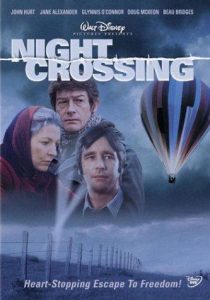
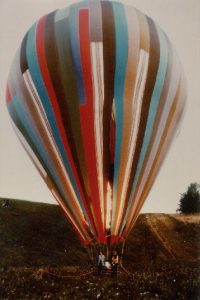 Years ago, I watched a movie called Night Crossing, which came out in 1982. The movie was based on a true story about two families trapped in East Germany in 1979. The only way they could be free was to escape to the west. Over the years during which Germany was divided, and basically locked down. At first the people felt panic. Many of them had family on the other side, and no way to get to them. It was horrible. Escape attempts while not constant, were met with severe repercussions. I’m sure many people thought that they would always be prisoners in East Germany. Since today marks, the 68th anniversary of the ill fated Soviet blockade of their section of Germany following World War II, I was reminded of the movie I had seen.
Years ago, I watched a movie called Night Crossing, which came out in 1982. The movie was based on a true story about two families trapped in East Germany in 1979. The only way they could be free was to escape to the west. Over the years during which Germany was divided, and basically locked down. At first the people felt panic. Many of them had family on the other side, and no way to get to them. It was horrible. Escape attempts while not constant, were met with severe repercussions. I’m sure many people thought that they would always be prisoners in East Germany. Since today marks, the 68th anniversary of the ill fated Soviet blockade of their section of Germany following World War II, I was reminded of the movie I had seen.
I was so surprised about the elaborate lengths the family had to go to, in order to buy the materials needed to make a hot air balloon, with out arousing suspicions. To buy enough of the silk for the balloon, they had to go to several different locations, and tell the clerks that they were building tents for a scout group to use to go camping. I couldn’t imagine having to lie to a store clerk in order to purchase material, but then I have never lived anywhere, but in a free society, where the individual person had the right to do pretty much what they pleased. That was something that some of the people of that time, in East Germany, had never known.
While the situation was traumatic, I found myself…somehow fascinated with the process, the planning, the forethought, and the tenacity of these families. I found myself rooting for them every step of the way. Rooting for them wasn’t the thing that surprised me, however. It really was how interested I was in all the strategizing, and yes, the danger of it all. I don’t suppose the event felt anything like that to them, however. For them, this was life and death, because if they were caught, they would be killed. They would have one chance to escape, 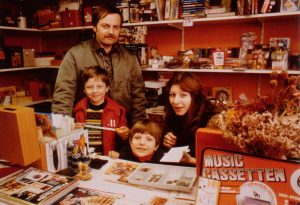
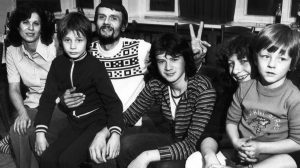 and one chance only. And they still had to make the crossing, and the landing, without getting caught up in the barbed wire fencing, or landing on a fence somewhere. The whole event, while an exciting story for me, was probably an event that they could not wait to put behind them…and I don’t blame them there.
and one chance only. And they still had to make the crossing, and the landing, without getting caught up in the barbed wire fencing, or landing on a fence somewhere. The whole event, while an exciting story for me, was probably an event that they could not wait to put behind them…and I don’t blame them there.
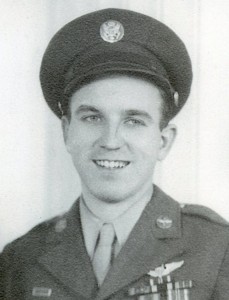 It’s hard for me to think about D-Day, without wondering what things were going through my dad, Allen Spencer’s mind on that day. Each branch of the military had their own part to play and each was in much danger. I suppose it’s possible that the men on the ground were in the most danger, but in reality, anyone who was involved that day faced grave danger. Soldiers could be shot and killed, ships could be sunk, and planes could be shot down. No matter how the attack came, death was often the result, and in battle it was inevitable.
It’s hard for me to think about D-Day, without wondering what things were going through my dad, Allen Spencer’s mind on that day. Each branch of the military had their own part to play and each was in much danger. I suppose it’s possible that the men on the ground were in the most danger, but in reality, anyone who was involved that day faced grave danger. Soldiers could be shot and killed, ships could be sunk, and planes could be shot down. No matter how the attack came, death was often the result, and in battle it was inevitable.
My dad was a young man of just 20 years. That is the age of my two oldest grandchildren, and I simply cannot imagine either of them being in that position. Of course, they could handle it, because twenty year olds have been fighting wars for as long as wars have been fought. It is me, and my mind, that can’t wrap itself around the idea of them being in an airplane providing air support over a battlefield. For my dad, every mission held an adrenalin rush, a degree of excitement, and a large degree of dread, mixed with the need to push back fear. Flying in the B-17G Bomber was an exciting thing for him, but unfortunately it had to 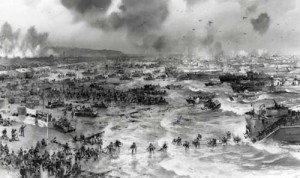 be mixed with the reality of the fact that those bombs were killing people…even if they were the enemy. They often had no say in the matter, they were an enemy of the Allied Forces simply because they lived in the country they did.
be mixed with the reality of the fact that those bombs were killing people…even if they were the enemy. They often had no say in the matter, they were an enemy of the Allied Forces simply because they lived in the country they did.
The air war was vastly different from the ground war, but that didn’t make either more of less dangerous. The Luftwaffe was not widely used on D-Day, but did come racing in over the following days. The weather was bad that first day, and that was definitely to the advantage of the Allied troops. Nevertheless, there were German forces involved, and without air support, they could not have pulled off the victory they did at Normandy. The planes that were there to provide air support, were basically magnets for the 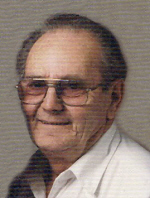 Luftwaffe, and any other enemy forces on the ground. Flying over Normandy was not a task to be taken lightly. Their job was to keep the bombers, tanks, and other soldiers off of the ground troops. The men risked their lives every second that they were in the air. The men on the ground were so vulnerable, and it was imperative that they have good air cover to keep as much enemy fire off of them as possible. It was very clear that without the air support, D-Day would not have been possible.
Luftwaffe, and any other enemy forces on the ground. Flying over Normandy was not a task to be taken lightly. Their job was to keep the bombers, tanks, and other soldiers off of the ground troops. The men risked their lives every second that they were in the air. The men on the ground were so vulnerable, and it was imperative that they have good air cover to keep as much enemy fire off of them as possible. It was very clear that without the air support, D-Day would not have been possible.
I am very proud of the part my dad played in D-Day, as I am of men like my Uncle Jim Wolfe, who was one of those men on the ground on that fateful day. Their job was a very dangerous one, and many of them would not see the sun set that night, but they had a job to do, and so they went out to battle for the freedom of those who were oppressed by the evil that was Hitler. It is a battle we will never forget, nor will we forget the men who fought there, especially those who gave all.
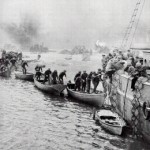 Not many disastrous wartime defeats could be declared a miraculous success, but in May of 1940, with the Germans advancing quickly toward Dunkirk the French, British, and Canadian troops were trapped between the German forces, and the English Channel. This situation was far more that a disastrous defeat, it was about to get catastrophic, because there appeared to be no way to get the Allied troops out of the way of the German forces, and the Allies were looking at the loss of thousands of soldiers, if something wasn’t done…and done quickly!!
Not many disastrous wartime defeats could be declared a miraculous success, but in May of 1940, with the Germans advancing quickly toward Dunkirk the French, British, and Canadian troops were trapped between the German forces, and the English Channel. This situation was far more that a disastrous defeat, it was about to get catastrophic, because there appeared to be no way to get the Allied troops out of the way of the German forces, and the Allies were looking at the loss of thousands of soldiers, if something wasn’t done…and done quickly!!
It was at this point that my 15th cousin 0nce removed, Winston Spencer-Churchill showed the world what a great master strategist he really was. He had warned the Allies that “the whole root, the core, and brain of the British Army” was stranded and likely to die in Dunkirk, if they didn’t come up with a way to evacuate them. A plan was devised, and given the code name, Operation Dynamo. This plan was really a God-given way of escape, where their seemed to be no way. In fact, Churchill 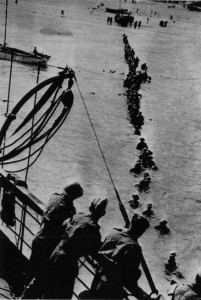 called it “a miracle of deliverance.” And so it was.
called it “a miracle of deliverance.” And so it was.
The plan used every available “ship”…right down to the smallest lifeboat. These vessels…thousands of them, many of which were manned by civilian volunteers, and each of them knew the danger they were putting themselves and their vessels in, but they bravely made the decision to participate anyway. On this day, May 26, 1940, at 19:00 hours, Vice Admiral Ramsey was given the orders and Operation Dynamo commenced. The order was given to proceed, amid information that Boulogne and Calais had been captured. This meant that the only port available was Dunkirk. Ramsey estimated that only 45,000 troops could be rescued. Lord John Galt had ordered the troops to retreat to the sea. As the Belgian army was defeated, King Leopold asked the Germans for an armistice. This dragged out the negotiations, and bought the Allies 24 hours to get their troops out.
The rescue was slow and, in fact took days. The weather prevented the Luftwaffe from attacking for a time, but that didn’t last long. Within a matter of days the weather cleatred and the Germans set out to try to stop the 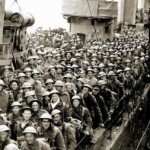 rescue that they had not realized was of the magnitude it was. From their attack, several ships wer sunk, but that still didn’t stop the seccess of the operation. By the time the last boat left Dunkirk harbor, about 338,226 soldiers (198,229 British and 139,997 French) were evacuated by a fleet of 860 boats.
rescue that they had not realized was of the magnitude it was. From their attack, several ships wer sunk, but that still didn’t stop the seccess of the operation. By the time the last boat left Dunkirk harbor, about 338,226 soldiers (198,229 British and 139,997 French) were evacuated by a fleet of 860 boats.
The evacuation was dubbed Operation Dynamo, because during World War One, Dover Castle was powered with electricity by a dynamo located beneath the castle. The castle was used as naval headquarters during World War Two, and the dynamo room is where British Vice-Admiral Bertram Ramsay planned the Dunkirk rescue mission. It is also the place where Ramsay briefed Churchill while rescue efforts were underway.
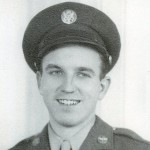 When the United States entered World War II, after the attack on Pearl Harbor, we were a nation with a score to settle. The Japanese had killed our people, and we vowed to make them pay. In addition to that, the Nazis were killing the Jewish people, and they had to be stopped. Their cruel killing of so many people in their gas chambers could not be tolerated. Revenge against the Japanese would have to wait for now, because the Nazi cruelty could no longer be kept hidden.
When the United States entered World War II, after the attack on Pearl Harbor, we were a nation with a score to settle. The Japanese had killed our people, and we vowed to make them pay. In addition to that, the Nazis were killing the Jewish people, and they had to be stopped. Their cruel killing of so many people in their gas chambers could not be tolerated. Revenge against the Japanese would have to wait for now, because the Nazi cruelty could no longer be kept hidden.
On of the biggest battles fought on German soil was the Battle of Berlin. It was fought over the course of a couple of years, and Britain’s Royal Air Force had been badly beaten by the Germans. Then when the United States joined in, things began to take a 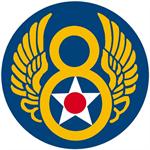 turn for the better. On May 7, 1944, the United States 8th Air Force sent 1500 bombers in to attack Berlin. More were sent the next day. The headlines were exuberant. Headlines like Berlin “Condemned to Death”, U.S. Planes Blast Berlin Twice, Capital Lies In Stark Ruins, and Berlin Again Plastered By Yank Fliers, were splattered across the papers. It was the ultimate attack on the heart of Nazi Germany from the Mighty 8th Air Force. I think everyone knew that Hitler’s days in power were numbered. It was true. The Nazis surrendered unconditionally a year later.
turn for the better. On May 7, 1944, the United States 8th Air Force sent 1500 bombers in to attack Berlin. More were sent the next day. The headlines were exuberant. Headlines like Berlin “Condemned to Death”, U.S. Planes Blast Berlin Twice, Capital Lies In Stark Ruins, and Berlin Again Plastered By Yank Fliers, were splattered across the papers. It was the ultimate attack on the heart of Nazi Germany from the Mighty 8th Air Force. I think everyone knew that Hitler’s days in power were numbered. It was true. The Nazis surrendered unconditionally a year later.
My dad was a Top Turret Gunner and Flight Engineer on a B-17G Bomber at this time, and while I don’t know if Dad took part in this attack, I can say that it is entirely possible. My dad didn’t talk about his war days much…most men from that era didn’t. I 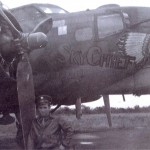 have to think that it was hard to remember those missions, because no matter how distanced you were from your target, you were still very aware that people were dying because of the bombs you were dropping. Sure, they were the enemy, and you were doing your job, but the were also humans. I think, if it were me, I would rather have to kill in the way my dad did…not looking into the eyes of the person you are about to kill, and in some attacks, the people didn’t have any idea that they were about to die. They, like my dad, were just doing their jobs. Still, they were soldiers under a cruel dictator, with no choice but to obey orders. Nevertheless, sad as it was for those people to die, I am very proud of my dad’s service. And if he was in this battle, then I am proud of that too.
have to think that it was hard to remember those missions, because no matter how distanced you were from your target, you were still very aware that people were dying because of the bombs you were dropping. Sure, they were the enemy, and you were doing your job, but the were also humans. I think, if it were me, I would rather have to kill in the way my dad did…not looking into the eyes of the person you are about to kill, and in some attacks, the people didn’t have any idea that they were about to die. They, like my dad, were just doing their jobs. Still, they were soldiers under a cruel dictator, with no choice but to obey orders. Nevertheless, sad as it was for those people to die, I am very proud of my dad’s service. And if he was in this battle, then I am proud of that too.
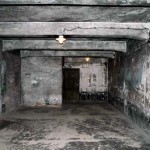 In the United States, 9-11 has become synonymous with the attacks on the World Trade Center, the Pentagon, and the downed plane in Shanksville, Pennsylvania. It is a day that we all look back to a day when, by a horrific act of terrorism, thousands of people died. As a collective people, we vowed never to forget. As United States citizens, however, we seldom give any serious thought to such days of rememberance in other countries. I suppose that is natural to a degree, but sometimes there are events in history that are so horrible that we can’t forget them. Such is the case with the Holocaust and the horrific treatment of the Jewish people at that time.
In the United States, 9-11 has become synonymous with the attacks on the World Trade Center, the Pentagon, and the downed plane in Shanksville, Pennsylvania. It is a day that we all look back to a day when, by a horrific act of terrorism, thousands of people died. As a collective people, we vowed never to forget. As United States citizens, however, we seldom give any serious thought to such days of rememberance in other countries. I suppose that is natural to a degree, but sometimes there are events in history that are so horrible that we can’t forget them. Such is the case with the Holocaust and the horrific treatment of the Jewish people at that time.
During the Holocaust years, Nazi Germany murdered six million Jews. The Nazi persecution of the Jews began in 1933, but the mass murder was committed during World War II, over a period of just four and a half years. Most of the murders took place between April and November of 1942. In just 250 days in which they murdered about two and a half million Jews. They had no real criteria for who lived and who died, except the ability to work. The killing only slowed down only when they began to run out of Jews to kill. The murders finally stopped when the Allies defeated them.
The Jewish people had now way to escape. They had been captured, dragged from their homes, and taken by  railroad in cattle cars to camps like Auschwitz, where the men were separated from the women and children, many of whom were killed right away, while the men were made to be slave labor…for as long as their strength held out. Once they were no longer useful, they were sent to the gas chamber. Being Jewish was considered a crime, punishable by death. There was no need for a trial in the eyes of the Nazis. If you were Jewish, you had to die. It was a horrible time in Jewish history, and it wasn’t the first time. It was just the most recent time in history. The Jewish people, like the people of the United States, had a need to remember the lost. A need to vow never to forget. That day is today. Yom Ha’Shoah, which means Holocaust Day, begins and sunset. In honor of those lost Jewish people, I will remember.
railroad in cattle cars to camps like Auschwitz, where the men were separated from the women and children, many of whom were killed right away, while the men were made to be slave labor…for as long as their strength held out. Once they were no longer useful, they were sent to the gas chamber. Being Jewish was considered a crime, punishable by death. There was no need for a trial in the eyes of the Nazis. If you were Jewish, you had to die. It was a horrible time in Jewish history, and it wasn’t the first time. It was just the most recent time in history. The Jewish people, like the people of the United States, had a need to remember the lost. A need to vow never to forget. That day is today. Yom Ha’Shoah, which means Holocaust Day, begins and sunset. In honor of those lost Jewish people, I will remember.
 As a young man of just under 20 years, my dad made his first trip overseas. It was the height of World War II, and Dad was the Top Turret Gunner and Flight Engineer on a B-17G Bomber in the 8th Air Force 385th Bomber Group. His bomber group had flown to Great Ashfield, Suffolk, England early that April. While they were at war, and that was a scary thing for any sane person, there was also a part on my almost 20 year old future dad that felt a bit of excitement. He was in a new country…an old country by the world’s standards, with things and places we just didn’t have in the relatively young United States. There were castles and old churches to see. In the United State, we had churches built of logs and wood, and modest homes often built the same way, but in England, there were buildings that had an artistic side to them. There were so many sights that he would not be able to see at home, and might never see again. No wonder her was excited.
As a young man of just under 20 years, my dad made his first trip overseas. It was the height of World War II, and Dad was the Top Turret Gunner and Flight Engineer on a B-17G Bomber in the 8th Air Force 385th Bomber Group. His bomber group had flown to Great Ashfield, Suffolk, England early that April. While they were at war, and that was a scary thing for any sane person, there was also a part on my almost 20 year old future dad that felt a bit of excitement. He was in a new country…an old country by the world’s standards, with things and places we just didn’t have in the relatively young United States. There were castles and old churches to see. In the United State, we had churches built of logs and wood, and modest homes often built the same way, but in England, there were buildings that had an artistic side to them. There were so many sights that he would not be able to see at home, and might never see again. No wonder her was excited.
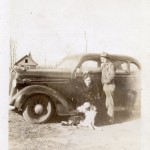 Dad knew of the dangers he and his fellow crewmen were facing in England and over Europe, but the excitement of being in a completely different country, so far away from home was something that was hard not to like. He found the people interesting, the structures elegant and beautiful, and the climate different from what he was used to. Of course, he missed his family, and wanted to make sure his mother didn’t worry too much, so that might have also been the reason that he always tried keep his letters light. For me, having the advantage of knowing that he made it through the war and came home safely, it is easy to look beyond my dad’s careful words, to the excitement that lies behind them. Dad always loved to travel, and while this was clearly different, it was still travel, and by airplane, no less. What young man of 19 years wouldn’t be excited about all the new things he was able to do and see.
Dad knew of the dangers he and his fellow crewmen were facing in England and over Europe, but the excitement of being in a completely different country, so far away from home was something that was hard not to like. He found the people interesting, the structures elegant and beautiful, and the climate different from what he was used to. Of course, he missed his family, and wanted to make sure his mother didn’t worry too much, so that might have also been the reason that he always tried keep his letters light. For me, having the advantage of knowing that he made it through the war and came home safely, it is easy to look beyond my dad’s careful words, to the excitement that lies behind them. Dad always loved to travel, and while this was clearly different, it was still travel, and by airplane, no less. What young man of 19 years wouldn’t be excited about all the new things he was able to do and see.
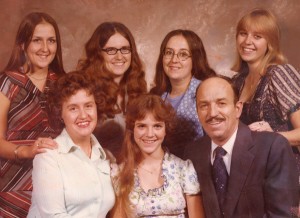 My dad has been in Heaven for almost ten years now, and I miss him terribly. His kindhearted ways endeared him to everyone from family to friends. Dad was always the thoughtful one…always a gentle man…and a gentleman. He wasn’t harsh, and he was always a gentleman when it came to treating women in the way they should be treated. Dad was quite possibly the last of the Southern Gentlemen…even if he wasn’t from the South. Looking back now on the ten years that he has been gone, I know that I miss him just as much today, as the day he left us…and I always will. Happy birthday in Heaven Dad. I know you and Mom are having a fine time. Just know that you are always in our thoughts. We love and miss you so much.
My dad has been in Heaven for almost ten years now, and I miss him terribly. His kindhearted ways endeared him to everyone from family to friends. Dad was always the thoughtful one…always a gentle man…and a gentleman. He wasn’t harsh, and he was always a gentleman when it came to treating women in the way they should be treated. Dad was quite possibly the last of the Southern Gentlemen…even if he wasn’t from the South. Looking back now on the ten years that he has been gone, I know that I miss him just as much today, as the day he left us…and I always will. Happy birthday in Heaven Dad. I know you and Mom are having a fine time. Just know that you are always in our thoughts. We love and miss you so much.
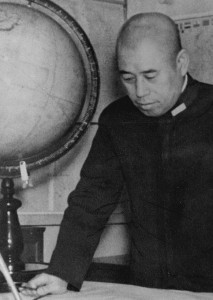 Some soldiers, no matter what side they are on or what branch of service they are in, are so good at what they do, that they become a must kill to the enemy. Admiral Isoroku Yamamoto was just such a soldier. Yamamoto held several important posts in the Imperial Japanese Navy, and undertook many of its changes and reorganizations, especially its development of naval aviation. He was the commander-in-chief during the early years of the Pacific War and so was responsible for major battles such as Pearl Harbor and Midway. That meant that the Unites States had a score to settle with the admiral. Nevertheless, this would be no easy task. The Japanese codes were difficult to break, and so locating the admiral at a time when they could be prepared to shoot him down was not going to be easy.
Some soldiers, no matter what side they are on or what branch of service they are in, are so good at what they do, that they become a must kill to the enemy. Admiral Isoroku Yamamoto was just such a soldier. Yamamoto held several important posts in the Imperial Japanese Navy, and undertook many of its changes and reorganizations, especially its development of naval aviation. He was the commander-in-chief during the early years of the Pacific War and so was responsible for major battles such as Pearl Harbor and Midway. That meant that the Unites States had a score to settle with the admiral. Nevertheless, this would be no easy task. The Japanese codes were difficult to break, and so locating the admiral at a time when they could be prepared to shoot him down was not going to be easy.
Finally, on April 18, 1943, the code breakers successfully broke the code, leaving the admiral vulnerable to attack, and Operation Vengence was born. The sole purpose of this mission was to kill Admiral Isoroku Yamamoto. The mission took place during the Solomon Islands campaign in the Pacific Theater of World War II. The code breakers found out that the admiral was set to be onboard a transport plane that would be flying over Bougainville Island. With everything finally in place, his transport bomber aircraft was shot down by United States Army Air Forces fighter aircraft operating from Kukum Field on Guadalcanal. It was a day to celebrate. The United States had been nursing a black eye where Pearl Harbor was concerned, and they had been looking to settle the score. Operation Vengence was the victory they had been waiting for.
The admiral’s death was a major blow to Japanese 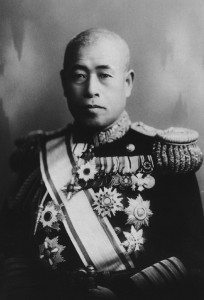 military morale during World War II, and was a major boost to the Allied Forces. The operation was intended as revenge for the Pearl Harbor attack which initiated the formal state of war between Imperial Japan and the United States.
military morale during World War II, and was a major boost to the Allied Forces. The operation was intended as revenge for the Pearl Harbor attack which initiated the formal state of war between Imperial Japan and the United States.
After the war, there was debate over which of the US fighter pilots involved in the raid deserved the official credit for downing Yamamoto due to conflicting first-hand reports from the participants, and has never been entirely resolved. I suppose that for the pilots it was a big deal, but for the US citizens it wasn’t the pilot that mattered, but rather that the mission had been successful. Americans hate to lose, and we will go after the villan who dared to attack us.
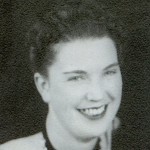 In every war, there are soldiers and there are those who serve in the background. Sometimes these people in the background have an astounding impact on the war effort. Such was the case, during World War II, when so many men were involved in the fighting, that it left very few people to work in the factories. It became obvious that the women were going to have to step up and help. Of course, it wasn’t all women either. My Uncle Bill Spencer did that work as well, because they wouldn’t take him in the service due to a hernia and flat feet. Uncle Bill, and his sisters, my aunts, Laura and Ruth Spencer, all worked at a job that would make the women famous as Rosie the Riveter. These people worked at jobs traditionally done by men, such as building bombers at Ford Motor Company’s Willow Run plant in Michigan, and the shipyards in Wisconsin, which is where my aunts and uncle worked. The work was different than work the women had done before, but they proved that they could do it. Their motto became just that…We Can Do It!!
In every war, there are soldiers and there are those who serve in the background. Sometimes these people in the background have an astounding impact on the war effort. Such was the case, during World War II, when so many men were involved in the fighting, that it left very few people to work in the factories. It became obvious that the women were going to have to step up and help. Of course, it wasn’t all women either. My Uncle Bill Spencer did that work as well, because they wouldn’t take him in the service due to a hernia and flat feet. Uncle Bill, and his sisters, my aunts, Laura and Ruth Spencer, all worked at a job that would make the women famous as Rosie the Riveter. These people worked at jobs traditionally done by men, such as building bombers at Ford Motor Company’s Willow Run plant in Michigan, and the shipyards in Wisconsin, which is where my aunts and uncle worked. The work was different than work the women had done before, but they proved that they could do it. Their motto became just that…We Can Do It!!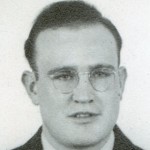
Now, seven decades later, and after several memorials in their honor, 30 of the “Rosie the Riveters” were honored with a trip to Washington DC to visit the National World War II Memorial. These women are in their 80s and 90s now, and it was a wonderful trip for them to go and see the memorial, pose for group photos with the US Capitol as a backdrop, have lunch at a Library of Congress building and visit Arlington National Cemetery. All that was awesome, but the real honor was that at every stop, people approached them, shook their hands, and said, “Thank you.” So often we overlook the opportunity to thank those who have served our country. We might feel like we are intruding, or don’t know what to say, or we just feel strange, but sometimes we need to set those feelings aside, so that we can honor all those who served…no matter in what capacity they served.
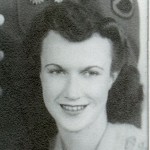 These women symbolized the American spirit that made this country great, and it is a spirit that needs to be brought back to this country. We are a great nation, with great people. When we make up our minds to do something, we get it done. The was the attitude these women took to the bomber factories and the shipyards. They decided that they could carry the load of the homefront to make the fighting men safer…and they did. I’m very proud that my Uncle Bill, and my aunts, Laura and Ruth were a part of such an elite group as these women who were honored today, I only wish they could have been a part of this trip. Both of my aunts are in Heaven now, and Uncle Bill is in a nursing home with Dementia, so they could not be there. Nevertheless, I’m very proud of all three of them…and these incredible women who were honored today.
These women symbolized the American spirit that made this country great, and it is a spirit that needs to be brought back to this country. We are a great nation, with great people. When we make up our minds to do something, we get it done. The was the attitude these women took to the bomber factories and the shipyards. They decided that they could carry the load of the homefront to make the fighting men safer…and they did. I’m very proud that my Uncle Bill, and my aunts, Laura and Ruth were a part of such an elite group as these women who were honored today, I only wish they could have been a part of this trip. Both of my aunts are in Heaven now, and Uncle Bill is in a nursing home with Dementia, so they could not be there. Nevertheless, I’m very proud of all three of them…and these incredible women who were honored today.
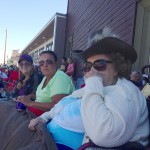 I saw an older woman standing at the bus stop today, waiting for the bus to arrive. That isn’t anything unusual, except that this woman was wearing a cowboy hat. I’m sure that many people wouldn’t think that was unusual either, given that I live in Wyoming, and in reality it was not that I thought it was unusual either, because I didn’t. What came to my mind was my mother, Collene Byer Spencer. Mom and my dad, Allen Spencer, embraced Wyoming, and the West in general, all their lives. They loved the history of the West, cowboy boots and cowboy hats, and they wore their western gear often, especially when they traveled.
I saw an older woman standing at the bus stop today, waiting for the bus to arrive. That isn’t anything unusual, except that this woman was wearing a cowboy hat. I’m sure that many people wouldn’t think that was unusual either, given that I live in Wyoming, and in reality it was not that I thought it was unusual either, because I didn’t. What came to my mind was my mother, Collene Byer Spencer. Mom and my dad, Allen Spencer, embraced Wyoming, and the West in general, all their lives. They loved the history of the West, cowboy boots and cowboy hats, and they wore their western gear often, especially when they traveled.
I know that there are lots of people who wear cowboy hats, as was proven by the older woman waiting for the bus, but what struck me at the time was that it brought back the memories of my mom wearing her cowboy hat. Mom especially loved 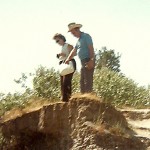 wearing her hat at the parade, as did my dad. They especially loved when the military people went by. Dad was a World War II veteran, and he was very proud of our soldiers. Mom loved it all. She would whoop and holler for every entry. I think she just didn’t want anyone to feel bad about their entry, and sometimes people would just sit there without clapping for anyone. Mom liked to make sure that everyone felt happy, parade or otherwise.
wearing her hat at the parade, as did my dad. They especially loved when the military people went by. Dad was a World War II veteran, and he was very proud of our soldiers. Mom loved it all. She would whoop and holler for every entry. I think she just didn’t want anyone to feel bad about their entry, and sometimes people would just sit there without clapping for anyone. Mom liked to make sure that everyone felt happy, parade or otherwise.
Mom and Dad had a number of cowboy hats, and the wore them all. They never went on vacation without a cowboy hat. I think they probably even took one on their 50th Anniversary cruise to Alaska. So many of my best camping memories include a cowboy hat. Dad never blew on a fire to get it going, he used his cowboy hat. Smart man, it would save a lot of work on the lungs…and the fire 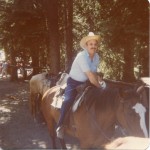 always started faster for him than for us. So many cowboy hat memories.
always started faster for him than for us. So many cowboy hat memories.
As I drove past the older woman wearing the cowboy hat, I had a smile on my face, because just seeing her standing there reminded me so much of so many good times from my past. As a kid, I would never have thought of myself as a cowgirl…at that time in my life a cowgirl or country music just weren’t cool. These days I love country music, but I guess I’m still not a cowgirl. Nevertheless, my parents were, and they were proud of it. It doesn’t matter to me what they identified themselves with…I just know that I am very proud of them. And I love and miss them very much.
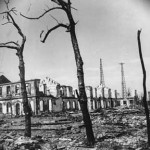 Anytime humans go to war, the one sure outcome is loss of life. That is just a fact of war. Of all the wars that the United States has been involved in, World War II interests me the most, because of my dad’s involvement, I’m sure. War is a brutal activity, but with the evil in the world, it is sometimes necessary. Evil nations leave us no choice but to step in. Such was that case with World War II, and Japan. On this day, March 9, 1945, the United States warplanes launched a new offensive against Japan. The campaign carried out involved dropping 2,000 tons of incendiary bombs on Tokyo over a two day period. Almost 16 square miles in and around the city were incinerated, and between 80,000 and 130,000 Japanese civilians were killed in the worst firestorm in recorded history.
Anytime humans go to war, the one sure outcome is loss of life. That is just a fact of war. Of all the wars that the United States has been involved in, World War II interests me the most, because of my dad’s involvement, I’m sure. War is a brutal activity, but with the evil in the world, it is sometimes necessary. Evil nations leave us no choice but to step in. Such was that case with World War II, and Japan. On this day, March 9, 1945, the United States warplanes launched a new offensive against Japan. The campaign carried out involved dropping 2,000 tons of incendiary bombs on Tokyo over a two day period. Almost 16 square miles in and around the city were incinerated, and between 80,000 and 130,000 Japanese civilians were killed in the worst firestorm in recorded history.
Early that morning, Air Force crews met on the Mariana Islands of Tinian and Saipan for a briefing. This would be a low level bombing attack on Tokyo beginning in the evening, but this one would be different. The planes would be stripped of all guns except for the tail turret. This would decrease the weight…increasing the speed of 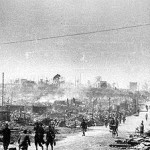 each Superfortress bomber. This also increased the bomb load capacity by 65 percent. Now each plane could carry more than seven tons of bombs. The most crucial thing, however, would be speed. If the plane didn’t make it out of the city, the airmen were warned to get to the water as fast as they could, because their very lives depended on it. Staying in the city would mean a fiery death, because they were going to be delivering the biggest firecracker the Japanese have ever seen.
each Superfortress bomber. This also increased the bomb load capacity by 65 percent. Now each plane could carry more than seven tons of bombs. The most crucial thing, however, would be speed. If the plane didn’t make it out of the city, the airmen were warned to get to the water as fast as they could, because their very lives depended on it. Staying in the city would mean a fiery death, because they were going to be delivering the biggest firecracker the Japanese have ever seen.
The first location would be the suburb of Shitamachi, which was composed of roughly 750,000 people. The destruction of Shitamachi would destroy the light industries, called “shadow factories,” that produced prefabricated war materials for Japanese aircraft factories. The citizens of Shitamachi never had a chance against the Superfortress B-29 bombers. Their fire brigades were undermanned, poorly trained, and ill equipped. All the people could do was to run from the inferno that the city had become. The planes…334 in all, came in a just 500 feet above the ground. Most of them didn’t make it. Doctors said, “The human carnage 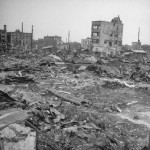 was so great that the blood-red mists and stench of burning flesh that wafted up sickened the bomber pilots, forcing them to grab oxygen masks to keep from vomiting.”
was so great that the blood-red mists and stench of burning flesh that wafted up sickened the bomber pilots, forcing them to grab oxygen masks to keep from vomiting.”
The entire raid lasted just a little longer than three hours. When it was over the Sumida River was clogged with bodies of the dead, burned beyond recognition. The sight was beyond anything anyone could have imagined. The loss of American lives was a mere 243 airmen, and these were considered to be acceptable losses. I suppose that these days, such a raid on known civilian targets would be considered unacceptable, but at the time it was considered acceptable, and even necessary. And it was successful, in a horrible sort of way.

